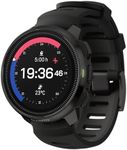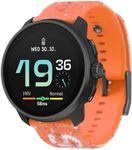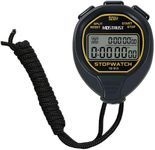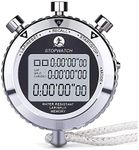Buying Guide for the Best Stopwatches
Choosing the right stopwatch involves understanding your specific needs and how different features can meet those needs. Whether you're timing a race, a workout, or any other event, the right stopwatch can make a big difference in accuracy and ease of use. Consider what you'll be using the stopwatch for, how precise you need the timing to be, and any additional features that might be beneficial for your activities.AccuracyAccuracy refers to how precisely a stopwatch can measure time. This is important because it determines how close the recorded time is to the actual time. Stopwatches typically measure in seconds, tenths of a second, or hundredths of a second. For casual use, a stopwatch that measures to the nearest second may be sufficient. However, for competitive sports or scientific experiments, you might need one that measures to the nearest hundredth of a second to ensure precise timing.
Lap/Split TimingLap or split timing allows you to record multiple times within a single event, which is useful for tracking performance over different segments. This feature is important for athletes who need to monitor their progress over laps or intervals. Basic stopwatches may not have this feature, while more advanced models can record multiple laps. If you're training for a sport or need to track multiple segments, look for a stopwatch with lap/split timing capabilities.
Memory RecallMemory recall is the ability of a stopwatch to store previous timings. This is important for reviewing past performances and comparing results over time. Some stopwatches can store a few laps, while others can store hundreds. If you need to keep track of multiple sessions or compare times over a period, a stopwatch with a larger memory capacity will be beneficial.
DisplayThe display of a stopwatch shows the time and other relevant information. A clear, easy-to-read display is important for quickly checking times during an event. Displays can vary in size and clarity, with some offering backlighting for visibility in low-light conditions. If you often use the stopwatch outdoors or in dim environments, consider one with a large, backlit display.
DurabilityDurability refers to how well a stopwatch can withstand wear and tear. This is important if you plan to use it in rugged conditions or during intense activities. Some stopwatches are water-resistant or shockproof, which can be beneficial for outdoor sports or activities. If you need a stopwatch that can handle tough conditions, look for one with enhanced durability features.
Ease of UseEase of use involves how simple it is to operate the stopwatch. This is important because a complicated stopwatch can be frustrating and time-consuming to use. Look for a stopwatch with intuitive controls and a straightforward interface, especially if you need to make quick adjustments during an event. If you're new to using stopwatches, a model with basic functions and clear instructions will be easier to manage.















